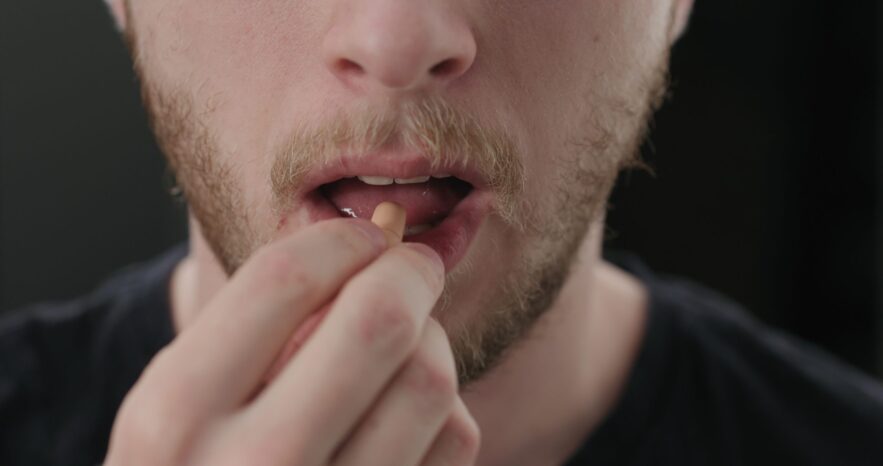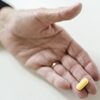In 1998, Pfizer introduced Viagra to treat male erectile dysfunction (ED), and the “little blue pill,” though not the blockbuster drug it was initially, still manages to rake in $5 billion in sales each year from the tens of millions of men who use it. Now Sprout Pharmaceuticals Inc. is one step closer to receiving FDA approval of flibanserin, a treatment for hypoactive sexual desire disorder (HSDD) in premenopausal women, which affects 10-20% of the female population.
It has been dubbed the “little pink pill,” even though it is different from ED drugs because it works through the central nervous system and must be used daily regardless of frequency of sexual activity, thus raising questions about different potential side effects.
Recently the majority of members from an advisory committee to the FDA took the next step to endorse flibanserin, which, if approved, would be the first drug ever to treat HSDD in women. The FDA is expected to make its final decision in August.
You could say we’ve come a long way baby. You could say that, but…
As I listened to almost 10-hours of testimony (pdf) by executives from Sprout as well as representatives from the FDA, patients and advocacy groups, I started to have serious concerns about the safety of this drug. Doctors and experts in OB/GYN, sexual dysfunction, urology, psychology and pharmacology also expressed deep reservations about the drug, which the FDA has already rejected twice.
Flibanserin is the first drug to address the sexual process through brain chemistry. Originally studied as an antidepressant, flibanserin was repurposed as a libido treatment after women in company studies reported higher levels of sexual satisfaction, according to a a href=”http://www.bigstory.ap.org/article/c7cf4cefd76f417999cec92680c5871a/fda-panel-backs-female-libido-pill-safety-conditions” target”_blank”>report by the Associated Press.
While flibanserin appears to be somewhat effective, increasing satisfying sexual events from 2.8 to 4.5 a month, it did not improve sexual desire. More than 3,500 premenopausal women were enrolled in the 3 Phase 3 pivotal trials that provided most of the evidence for safety and efficacy that the panel considered. Additional studies were also presented, looking at specific interactions with substances like alcohol.
Almost 2/3 of the target population — premenopausal women in their mid-30s (89% of trial enrollees were Caucasian) — experienced side effects of hypotension, syncope (fainting), dizziness, somnambulence (drowsiness), nausea and headache, as well as accidental injury, when taking a 100 mg tablet. The committee also had concerns about whether the population studied represented the patients who are likely to use the drug. They also questioned the robust placebo response, which was more than half of the response for participants on the drug.
Browse This Article
One Test of the Pink Pill — on Men (Huh?)
The dedicated study of concomitant alcohol use with flibanserin in 22 men and 2 women also raised red flags when presented to the panel because of an almost 10% increase in incidence of fainting, hypotension and depression with alcohol consumption. It was also troubling that only 2 women were enrolled. The obvious gender bias was duly noted by the experts, and I was surprised that they even allowed such a small trial, so heavily weighted to men. Not to mention that 50% of the intended recipients for this drug say they drink alcohol.
The clinical trial results also indicated an increase in side effects, like dizziness, in women who were also taking tryptophans (migraine treatments), SSRIs and SNRIs (depression treatments), and antihistamines (allergy treatments).
Flibanserin also had a significant negative effect on the enzyme CYP3A4, which is involved in the metabolism of approximately half the drugs that are used today, including acetaminophen, codeine, warfarin, statins, oral contraceptives and protease inhibitors, among others.
Finally, a small study in mice showed an increased risk (4x) of breast cancer, which raised eyebrows, although some experts testified that use of the drug for a year was not enough time to adequately assess risk.
The expert panel debated various ways to mitigate risk, like contraindications on labeling; a post-approval Risk, Evaluation and Mitigation Strategies (REMS<) program, including a Medication Guide to inform patients; a communications plan with “elements to assure safe use” (ETASU); mandatory certification of prescribing physicians and pharmacists; and even the most severe cautionary labeling — a Black Box Warning (pdf).
Certification of physicians would require them to read warnings to patients while certification of pharmacists would mean women could get the drug only from certified pharmacies where the pharmacist had received training about the risks of flibanserin. The panel shied away from this precaution, however, feeling that it would overly restrict access to the drug.
Meeting a Need – Or Creating One?
So why go forward with a treatment that causes so many side effects, especially among a patient population in which half said they regularly use alcohol, thus amplifying risk?
Because of the unmet need for a treatment to help women who have lost sexual desire.
To support the need for this drug, Sheryl Kingsburg, PhD, Chief of the Division of Behavioral Medicine in the Department of Obstetrics and Gynecology at MacDonald Women’s Hospital in Cleveland, explained the frustration many women experience when they lack desire for sex: “When a woman can’t access the reward center that triggers the ‘wanting’ [to have sex], it can lead to less communication, loss of self-confidence and negative body image. This is not due to bad relationships, fatigue, lack of time or [lack of] privacy.”
Many women and their husbands testified passionately about their personal experiences with this intimate problem. One woman even brought her daughter to the podium because she said HSDD can be hereditary.
“I want to want my husband, it is that simple,” said Amanda Parrish, a mother of 4 from Nashville. “For us, flibanserin is a relationship-saving and life-changing drug.”
A patient in the trial said that taking flibanserin worked for her “as if a light switch had been turned on.” She added, “I should be able to determine with my physician the risk of flibanserin against the benefit of treatment.” Another woman concurred, saying: “Women are intelligent and insightful decision-makers and can be trusted to evaluate the risk of side effects vs. benefits.”
“Women have the right to enjoy sex as much as men,” a woman testified. “Something has changed, and it is not the love we have for our partners. We do not have to accept having ‘duty’ sex. We should have options for treatment.”
Sally Greenberg, Executive Director at the National Consumers League in Washington, DC, said women are so frustrated, they are driven to the internet to order “snake-oil.” In fact, many women said they bought unapproved treatments online to enhance sexual desire, with names like “Scream Cream” and “Pure Romance.”
But lurking behind the outcry for an approved treatment is a targeted marketing campaign to set the stage for the unmet need by a group called Even the Score, which was financed in part by Sprout, the pharmaceutical company which bought flibanserin from Boehringer Ingelheim in 2010 after the drug failed to win approval by the FDA the first time around. It was rejected a second time by a panel of experts brought together by the FDA in 2010.
So Sprout has an expensive stake in the ground — to the tune of $50 million by private investors, according to Forbes.com. The New York Times recently reported that “Cindy and Robert Whitehead, a couple running a company that made a testosterone product for men, started Sprout to acquire flibanserin.”
Leonore Tiefer, PhD and clinical psychologist at the New York University School of Medicine, called Even the Score the “elephant in the room,” citing their relentless pursuit of doctors with slick marketing materials, fancy luncheons and “misinformation” in order to “lobby for questionable products, bully the FDA, and hamper research.”
Cindy Pearson, executive director of the DC-based National Women’s Health Network, said that need does not create proof that a treatment is safe and effective. ”It is not an appropriate response to approve anything or something,” she said. “If a company could show that a drug is effective based on clinically significant outcome measurements, then we’d be for it, but this study has not been done. Women can make good decisions if they have good information. Sprout has not provided it.”
PharmedOut director Adriane Fugh-Berman, MD, of Georgetown University, also asked the panel to base their decision on science, not marketing. “Drinking and oral contraception exacerbate the side effects,” she said, “and young women do a lot of both: 17% of premenopausal women are on the pill and more than half of the women drink.”
In addition, the committee members and even the FDA officials acknowledged the inevitable off-label use of flibanserin among post-menopausal women who could be subject to unknown risks because they were not included in the trials, as flibanserin is indicated for premenopausal women.
Keep in mind that flibanserin requires daily administration to be effective for this chronic condition, meaning women are likely to be on the drug for a very long time. This fact made me wonder how realistic it is to think women will abstain from alcohol forever or stop taking birth control?
A Decision Guided by Science — Or Guilt?
So when the committee voted 18 to 6 in favor of recommending approval, albeit with intent to add cautionary labeling and strategies to mitigate risk, I wondered how much they were influenced by guilt. A recent New York Times editorial posited that the committee was “driven primarily by recognition that women who could benefit from the drug might be reluctant to take it unless it had regulatory approval.”
Considering the number of questions the panel had about side effects and trial design, I also felt the decision by 18 members to move forward with flibanserin was not based on evidence, but with perceived need. All 18 votes came with precautions to mitigate risk and beef up safety communication. The head of the panel even commented after the votes were tallied that she had never heard the votes “for approval, but with cautions” so closely resemble the “against approval” votes when each panel member presented the reasoning behind his or her decision.
The FDA has been accused of gender bias when deliberating approvals of sexual dysfunction treatments. But PharmedOut’s Dr. Fugh-Berman disagreed: “It’s not sexist for the FDA not to approve a drug that it doesn’t believe is effective or safe. It’s a classic marketing technique to first create a problem, and then sell the solution, and that’s what’s going on here,” she told ABC News last year. “To approve this drug would set the worst kind of precedent: that companies that spend enough money can force the FDA to approve useless and dangerous drugs,” she said.
When the meeting finally ended, I came away with a better understanding of the urgent need for a treatment, but this hackneyed adage also popped into my head: Be careful what you wish for. I am not a doctor, but the evidence of benefit seemed slight in the face of potential side effects. Fainting is no joke to begin with, let alone when it happens to someone behind the wheel.
I will be disappointed if the FDA is intimidated by claims of gender bias, instead of basing its decision on scientific evidence. Women need a treatment: yes. But it should be safe, especially as this drug will be used daily and for a long time.






